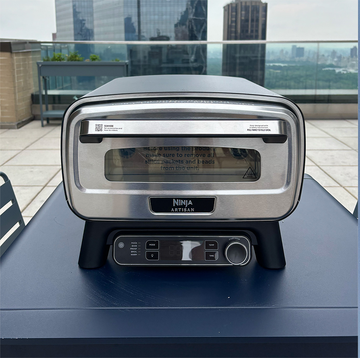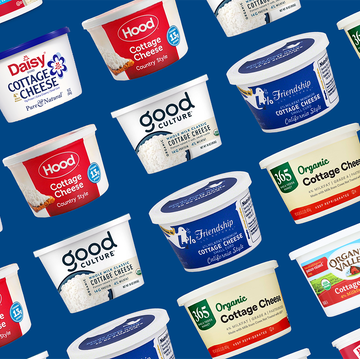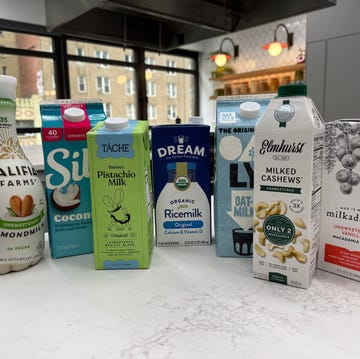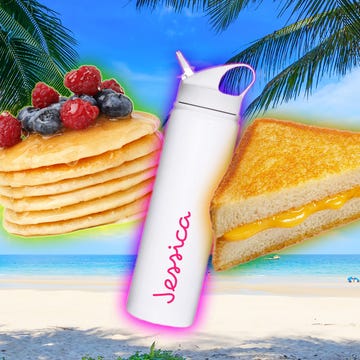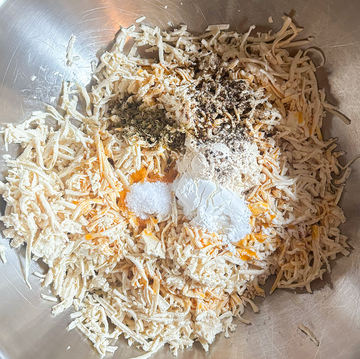Walk into most supermarkets, and half the fruits and veggies are encased in packaging—beyond bagged salads and containers of berries. From plastic clamshells of spinach to individually plastic-wrapped onions, it can be difficult to find fresh, loose produce. But does all this packaging make a difference when it comes to shelf life, taste, and food safety?
To explain whether plastic makes for better or worse produce, we tapped Caroline West Passerrello, R.D., spokesperson for the Academy of Nutrition and Dietetics and former a grocery store dietitian.
Packaging Helps Extend The Shelf Life Of Some Produce
Produce spoils for the same reason any other food turns stale or goes bad: oxidation. Food scientists discovered that adjusting the oxygen-to-carbon dioxide ratio inside a bag of lettuce will help it stay fresh for longer. How does this happen? The process, called "modified atmosphere packaging," is done naturally using gases the plants release when cut.
Bagged Greens Are Not More Food-Safe
A bag of greens might have an extended shelf life, but just because it's packaged doesn't mean it's safer to eat. Many food contamination scares come from pre-cut bagged lettuce. Torn leaves are more likely to contain bacteria because there are more edges to contaminate, West Passarello says. Plus, a warm, moist, and sealed environment is a perfect incubator for E. coli, salmonella, and listeria.
While there are risks with pre-cut lettuce, properly processed and packaged greens can be safe when handled correctly. Per current FDA and CDC food safety guidelines, keep pre-cut and whole lettuce refrigerated at 40°F or below, follow "use by" dates, and practice proper hand hygiene when handling your produce.
Note: All the washing in the world won’t scrub off E. coli. To minimize your risk, check for and avoid products involved in recalls due to contamination.
Thin-Skinned Produce Can Benefit From Packaging
A nude pear is more prone to bruising than one cradled in a Styrofoam net. Thin-skinned English cucumbers wrapped in plastic will stay fresher for longer than loose cukes. For more delicate fruits and veggies, consider looking for extra packaging to help ensure a safe ride home from the store.
But just because those cucumbers are packaged doesn't mean they can skip a good cleaning. You should still wash all produce before consumption.
Pre-Cut Produce Isn't Always Worth The Price
Diced butternut squash, pineapple rings, and spiralized beets may save you prep time in the kitchen, but they can come at a nutritional cost.
"Cutting fruits or vegetables exposes them to oxygen and light, and sometimes heat, all of which affect vitamin retention in food," West Passerrello says. Whole fruits and vegetables retain their vitamins and other nutrients longer than those that have been sliced and diced.
Fruits and veggies with water-soluble vitamins, like strawberries, watermelon, bell peppers, and pineapple, are at the highest risk of nutrient loss because water evaporates quickly from cut produce. For optimal nutrition, chop produce on demand and store any leftovers in an air-tight container.
Tomato Packaging Doesn't Affect Flavor
Dimpled plastic safeguards, cardboard reinforced sleeves, elaborate netted bags—there are various advanced packaging options for everyone’s favorite fruit.
While the packaging may prevent the occasional crushed tomato, West Passarello says it won’t affect the flavor of the actual product.
To extend the longevity of your tomatoes, she recommends storing them on the counter with the stem side facing up. The end with the stem (also called the “crown”) is more delicate. If you store the tomato with the crown down, the weight of the rest of the tomato will prematurely soften the fruit.






